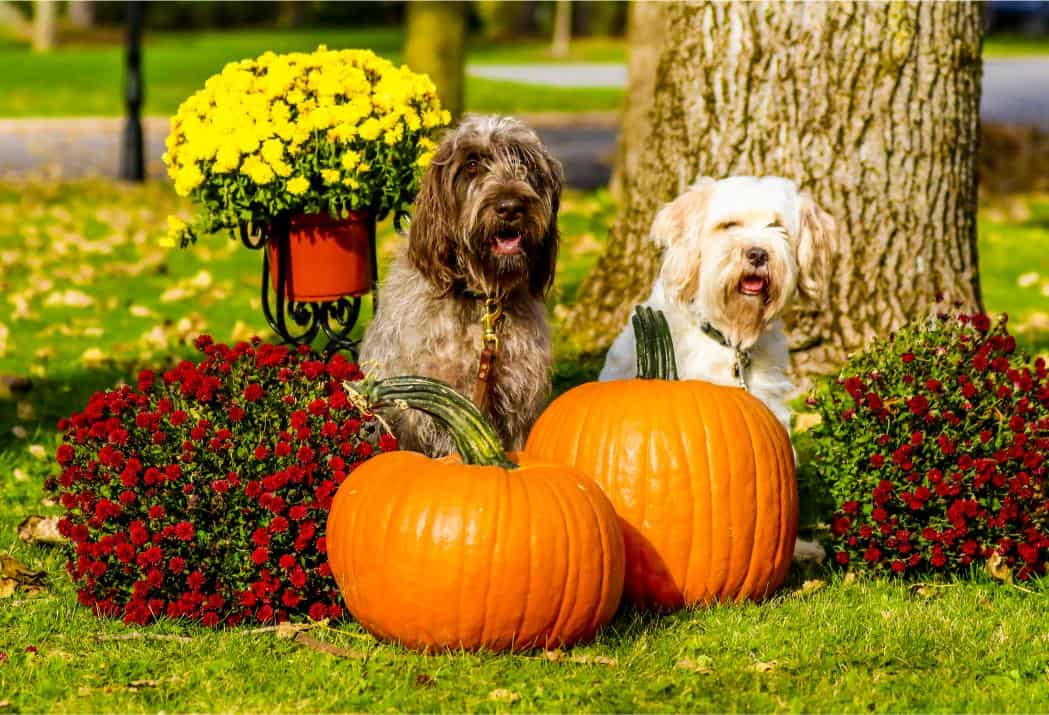Fall Plants Hazardous To Pets

As the leaves turn and the air turns cooler, it’s easy to get swept up in the beauty of fall. But while you’re decorating with seasonal blooms or enjoying time outdoors with your pets, it’s essential to know that many popular fall plants can pose serious health risks to dogs and cats. At Rocklin Ranch Veterinary Hospital + Urgent Care, we want to help you identify which fall plants are pet-safe, and which ones you and your pets should avoid.
Fall Plants That Can Harm Your Pet
Whether it’s a stroll through the neighborhood or a quick trip into your own backyard, curious pets can find trouble in surprising places. Fall brings out a variety of plants and fungi that are toxic to animals, and ingestion—even a nibble—can quickly turn into a medical emergency. Knowing which plants are dangerous is the first step to keeping your four-legged friends safe this season.
Common Toxic Fall Plants in Northern California
Here are some of the most common toxic plants commonly seen in the fall in the Rocklin area. Many are popular in landscaping or appear naturally in parks and wooded areas.
- Chrysanthemums: A fall favorite, “mums” contain pyrethrins that can cause drooling, vomiting, diarrhea, and incoordination—especially in cats.
- Autumn Crocus: All parts of this plant are highly toxic. Ingestion can lead to intense gastrointestinal symptoms, liver and kidney damage, and even death.
- Oleander: Common in California landscapes, oleander contains cardiac glycosides that can disrupt heart rhythms and lead to fatal outcomes if ingested.
- Sago Palm: Although technically not a seasonal plant, sago palms are common in our area, and are extremely toxic year-round. The seeds are especially dangerous, often causing liver failure.
- Oak Leaves and Acorns: Found in abundance locally, especially in parks, acorns can cause vomiting, lethargy, and kidney damage.
- Wild Mushrooms: After the first fall rain, mushrooms may sprout in lawns or along trails. Some varieties are deadly, and identification can be difficult even for experts.
It’s a good idea to walk your yard regularly and remove any of these plants or fungi if you find them. And if your pet is ever unsupervised outdoors, keep an eye out for signs of digging, chewing, or grazing behavior.
Safer Seasonal Alternatives: Pet-Safe and Non-Toxic Plants
The good news? You don’t have to skip fall flair altogether. Plenty of beautiful, hardy plants are non-toxic and pet-friendly. Here are a few safe choices for gardens and planters in the Rocklin area:
- Marigolds: Easy to grow and bright in color, these flowers are considered non-toxic to pets.
- Snapdragons: These tall, eye-catching plants are safe for both cats and dogs.
- Camellias: This attractive shrub does well in shady spots and poses little risk to pets.
- Sunflowers: A seasonal staple that’s safe and fun. Just be sure to sweep up any loose seed hulls.
Even non-toxic plants can cause a little stomach upset if eaten in large quantities, so it’s still wise to supervise outdoor playtime.
Warning Signs: Is Your Pet Suffering from Plant Poisoning?
If your pet has chewed on or ingested a suspicious plant, it’s better to act quickly than wait for symptoms to worsen. Watch for:
- Vomiting or diarrhea
- Excessive drooling or foaming at the mouth
- Loss of appetite
- Tremors, seizures, or uncoordinated movement
- Lethargy, collapse, or behavior changes
These signs can appear within minutes or may take a few hours to develop. Either way, they warrant veterinary urgent care or emergency service.
When to Seek Urgent or Emergency Care
At Rocklin Ranch Veterinary Hospital + Urgent Care, we offer same-day appointments for pets showing signs of toxicity, allergic reactions, or sudden illness. Our hospital is open Monday through Friday from 7:30 a.m. to 9:00 p.m., and Saturday through Sunday from 8:00 a.m. to 5:30 p.m.
If your pet eats a toxic plant and begins vomiting, drooling, or showing signs of distress, call us at (916) 624-7387. Calling ahead allows the team at our urgent care location to prepare for your pet’s specific needs and ensure timely treatment.
If your emergency happens after business hours, please contact:
- Veterinary Specialty Hospital—Roseville | (916) 783-4655
- MarQueen Pet Emergency & Specialty | (916) 757-6600
Keep Autumn Pet-Safe with a Little Help from Us
Fall should be a season of cozy comforts—not pet emergencies. By choosing non-toxic plants and keeping a watchful eye on your furry companions, you can enjoy everything autumn has to offer without added worry.
